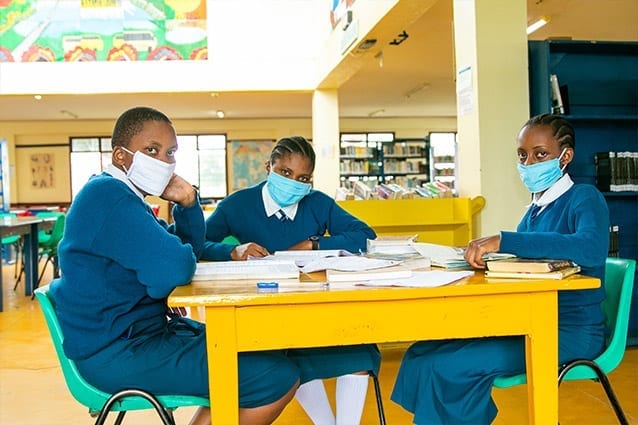It’s 6am and thousands of parents and students have come from all over Arusha with hopes that this day will change the future of their child’s education, forever. The road outside St Jude’s is overflowing with people as everyone eagerly waits for the school gates to burst open. It’s the first Selection Day of the year for Standard 1 and 2 students.
St Jude’s Selection Days are annual enrolment events that invite eligible Standard 1 and 2, Form 1 and Form 5 students to sit tests for an academic scholarship. Students from government schools receive an invitation letter to sit the test, and for Standard 1 and 2, announcements are also made on the local radio.
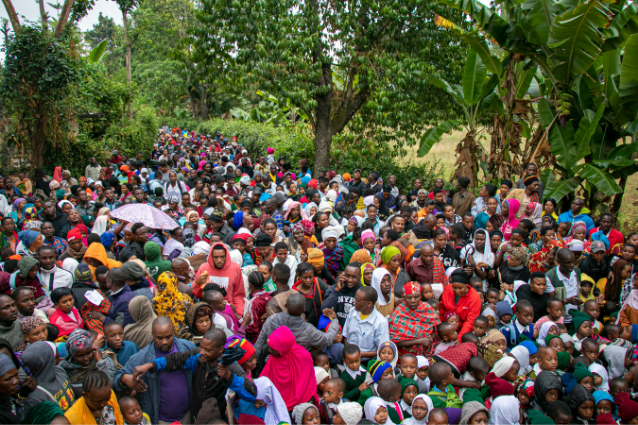
Around 1,000 prep and primary students attend Standard 1 and 2 Selection Day, hoping to receive an academic scholarship for St Jude’s. And this year the numbers were huge!
“We had more than 1,100 students come for registration. This is a lot more students compared to other years,” said Philip, Head of Community Relations.
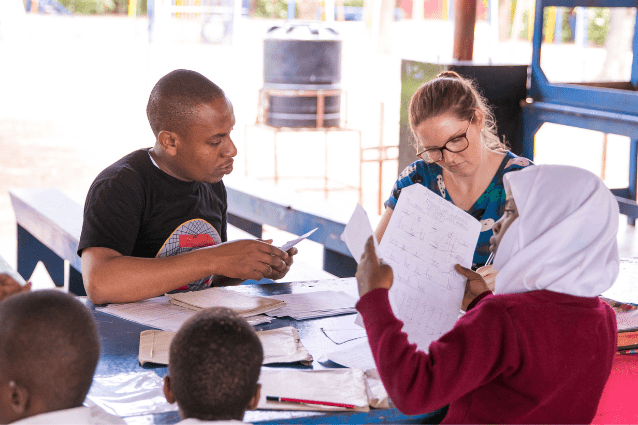
A rigorous selection process is put in place to ensure that only the poorest and brightest students in Arusha receive scholarships to St Jude’s. First, students are registered to ensure they were invited, or they are the right age from a surrounding government school. Then, they are taken to do basic reading and writing tests to evaluate their academic skills. Most students are only six years old, so the testing is quite basic. This is followed by document verification to make sure students are the correct ages and match their documents before choosing the first successful batch that will go through the next stage.
“The team managed to reduce 1,127 students to 287 students who will be going through to the next stage, which is a series of house checks to assess their poverty level. After house checks, we aim to lower the number to around 100 students who will sit probation for two weeks to test their academic skills and behaviour further. Finally, we hope to enrol up to 90 new students. That’s the number of places we have available for 2021,” Philip explained.
House checks are an essential part of the selection process. It’s through house checks that poverty assessments are done to ensure that these students truly deserve a place at St Jude’s.
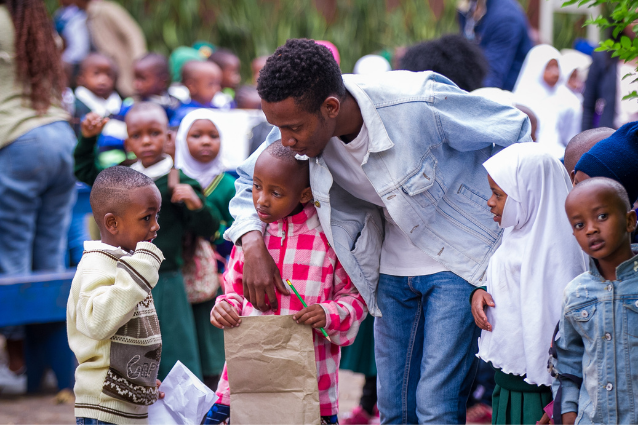
Noah, a St Jude’s graduate, working in the Supporter Relations department, volunteered to help on the day. “Student selection day has always been such a wonderful experience. It is my third time taking part, and each time I do, it reminds me of when I came for Selection Day back in 2006.”
“My role was to take students from the school gate to the dining hall where they were doing exams, and later, I helped in scanning their documents for verification,” Noah explained.
Having gone through the selection process, Noah said, “My Selection Day remains to be one of the most special and memorable days of my life. Being among the selected few out of thousands of students was a day that changed my life. I remember going to meet my parents after being selected, one of the most precious moments in any selection at St Jude’s. Words can’t explain the happiness that my parents and I had on that day.”
During the selection process, parents are not allowed to be part of the procedure and instead, anxiously wait outside the gates to receive their child, hopeful that they made it to the next stage.
“The massive crowd of parents were eager to know how their children's went. We can only take in a certain number of students and therefore, as a facilitator, I needed to put myself in the parent’s shoes. I had to understand their situation and remain creative in helping them cope with any result (good or bad),” explained Focus, Community Development Coordinator.
Focus’ role was to make sure that the parents and guardians understood what was happening as well as disseminate the necessary information about the next stages.
As a new member of staff volunteering on his first Selection Day, Focus said, “The experience was uplifting. It was great to be part of the process to select and support disadvantaged families residing in Arusha. The response from the parents was great. They were all eager to see their child getting through the various tests.”
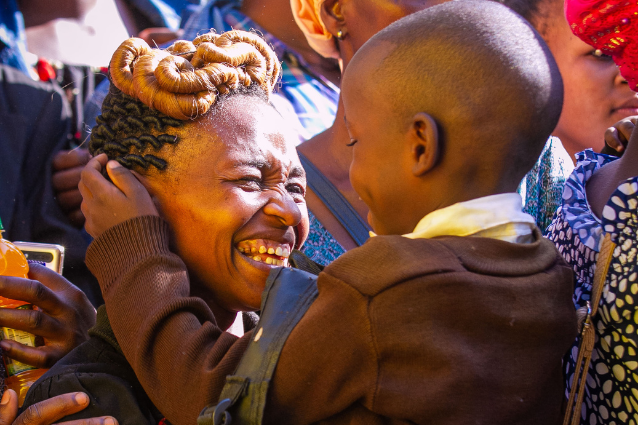
He added, “I was super excited to see the students who had passed the testing stage coming out to meet their parents. Both parents and I felt the same intrinsic and extrinsic joy. It was great to watch the parents catching the vibe and rejoicing for their children.”
Selection Day is the first stage in breaking the poverty cycle for students and their families. Once they have successfully passed the rest of the process, these students will have an opportunity to receive the gift of free, quality education at St Jude’s. This is just the beginning of a very hopeful future.
St Jude’s Girls’ Secondary School has a total of nine clubs. Each club is unique and provides a different experience to students.
Irene and Faith, charming and bubbly secondary students took the time to list all the clubs. “We have nine clubs namely Scouts, Journalism, Roots & Shoots, Entrepreneurship, Tembo, Fema, Computer, Youth of Tanzania Association (YOTA) and Art Club,” says Irene. She is the school’s Head Girl and also a leader of Scouts Club.
These clubs allow students to reach beyond academics and participate in activities outside the classroom; promoting character building, developing life skills and expanding students’ interests and passions. With mentorship and guidance from teachers in each club, students receive help in assessing their performance with club projects and acquiring skills they can use after they graduate.

“My favourite club is journalism because I feel like I am myself when I’m in this club. I enjoy it, and it’s so much fun. We have our newsletter that we are still writing. We haven’t posted it, but we will be publishing it soon,” says Faith, who belongs in the Journalism Club. She’s also a chairperson of the Entrepreneurship Club.
Ever since Irene joined her club, she feels like her personality and character has developed. Irene is more confident with herself than she was before.
“Scouts Club is everything to me. 90% of everything I do is all about that. I love it! The club gives me new experiences, more lessons and more skills. For example, before joining the club, I used to be scared of public speaking, but now I can lead the assembly without any stage fright,” says Irene with a bright, confident smile.

Irene and Faith believe that these school clubs can help students achieve more in their lives.
“After I graduate, I wish to become both a chef and a journalist. With the skills I’m learning from the Entrepreneurship and Journalism Club, I know I can work as a chef, open my own business while practising broadcast journalism,” Faith ambitiously says.
Teachers are also heavily involved in these clubs by supervising and assessing the students’ performance. Ms Judith, a librarian at the girls’ secondary school, explains more about the club activities, “We normally have club sessions as extra-curricular activities once a week after school hours. The main objective of introducing club activities in our school is to promote students discovering and experiencing their talents and passion in line with the school values.”

She adds, “Clubs have a huge impact on our girl's education, as it allows them to explore and learn more about their talents. The capability to go beyond academics helps them in their social life and especially to adjust to life after graduation.”
“Some of the skills developed in these clubs are self-reliance, volunteerism, and entrepreneurship, which will help them become responsible people in their communities and good ambassadors for the school.”
At St Jude’s, clubs not only give students the chance to sharpen their interests, hobbies and talents but also develop their leadership and social skills; in turn, creating community-focused leaders who will fight poverty through education.
Due to COVID-19, schools in Tanzania were closed from March to June this year. Since reopening, the Tanzanian Ministry of Education recently announced a new schedule for all national examinations in both primary and secondary schools. The newly introduced academic calendar will see Standard 7 students sit their exams early October, Form 2 in November and Form 4 towards the end of November.
National examinations are taken annually with strict supervision from the Tanzania National Board of Examinations under the Ministry of Education. The board is responsible for all national exams, many of which determine whether a student will be eligible to proceed to their next level of education; students sit these exams in Standard 4, Standard 7, Form 2, Form 4 and Form 6.
Salma and Benson are in Standard 7 at St Jude’s, the last year of primary school. Sitting the Standard 7 National Examinations in October is a new experience for both, as they didn't expect the exams to be so late in the year. But, both students say they’ve been studying hard, preparing and focusing on ensuring they get the best results possible.
“Our teachers are giving us weekly tests so we can get used to as many questions as possible,” says Salma.
Benson also adds that “I ask teachers many questions and request for extra work.” He continues, “In preparing for my national exams, I also like studying in groups with my friends. I find that asking hard questions, and discussing past papers allows me to understand the subjects better.”

At St Jude's, students are motivated to study hard to reach their dreams and become community-focused leaders. Students know very well that the way to achieve their goals and help lift their families and communities out of poverty is through a commitment to their education. And it’s the support of the dedicated and inspiring teachers that help students to do this.
Mr Deo, a mathematics teacher at St Jude’s Primary School, says, as teachers, they use many tactics to make sure that students will perform well in the national exams. “One of the tactics we use is giving the students a lot of questions from the past national examination papers weekly as well as monthly tests.”
“Also, to compensate for the time that students had stayed home due to the shutdown caused by the outbreak of COVID-19, we also have extra classes on Saturdays. We believe this will cover for the lost time, and our students will be able to do well in the national examinations.”
During the school shut down from March to June, students also received four rounds of study packs to help them continue their education while at home. The packs included worksheets, lesson notes, mock exams, an exercise book, and even marking guides. These study packs ensured students were not left behind in their studies upon their return to school.

Last year, St Jude’s ranked in the top 1% in the country for the Standard 7 National Examinations, and 100% of the students achieved A’s and B’s. Thanks to teachers like Mr Deo who are dedicated and passionate about teaching, the school was also the top-performing school in all of Tanzania last year in advanced mathematics.
Although the academic calendar has been adjusted for the rest of the year, students are passionate about their studies, and teachers are highly motivated to ensure students do the best in their exams.

Science subjects are deemed to be too difficult by female students. However, Mr Nzinyangwa Mcharo disputes this notion.
Mr Mcharo is the Academic Manager here at The School of St Jude. He begins the conversation by confirming that the overall number of girls enrolled at St Jude’s is over 60% as of July 2020.
“The enrolment is based on merits and not because of gender selection,” said Mr Mcharo.
Currently, most schools in Tanzania lack science teachers, particularly women, making science, technology, engineering and mathematics (STEM) education predominantly dominated by men.
One of Mr Mcharo’s initiatives as Academic Manager is to encourage more female students to opt for science subjects.
“Most of the time, it’s a social stigma that math and physics are hard subjects. However, I can tell you about my own experience; I think history is more difficult than mathematics. I believe that anyone can pass mathematics when they focus.”
“I believe that science is very easy, and it’s also about your life. When you study biology, you study about health. You study physics, you study about machines. You study chemistry, you study about chemicals, some of them used in our daily life like in the kitchen. So it really depends on how those subjects get taught and the student’s passions.”

Mr Mcharo also emphasised on the best way these science subjects are taught. “If you teach science only to get grades, students will get upset because they don’t see any relevance of the subject. However, if you link science with every-day life, there will be no reason why a student won’t opt for science subjects.”
Mr Mcharo and St Jude’s academic staff have been at the forefront of promoting female teachers in STEM education to increase the number of female staff and ultimately have role models for girls in science subjects.
“So, the first thing is to have role models, and this can only be done if we create them to influence female students to focus on STEM. In our approach to science, we have made some initiatives such as opening a girls’ school with fully-equipped science labs and providing full university scholarships through the Beyond St Jude’s program in the field of science with education.”
To Mr Mcharo, STEM defines the future for successful female students.
“If we can get our girls into these STEM careers – science, technology, engineering and mathematics, we will get role models. This will remove the bias and improve the wellbeing of our society.”

Herieth, a Class of 2018 alum, is a true inspiration to her fellow female students who would like to pursue science studies. Her academic achievements at St Jude’s earned her a full scholarship through the Beyond St Jude’s program to study Bachelor of Science with Education at the University Dar es Salaam - Mkwawa Campus in Iringa, Tanzania. She is the first St Jude’s graduate to be offered this scholarship, and after completion of her degree, there is a possibility that Herieth will be offered a job, here, at St Jude’s.
Since opening the girls’ secondary school, St Jude’s has seen a significant increase in the number of female students interested in studying science.
Aloyce, a Form 3 student at St Jude’s Girls’ Secondary School, is one of the students with a passion for science studies. She says her favourite subject is physics, "When I graduate, I want to become a medical scientist.” She adds that; “Science subjects are not as hard as most people portray them to be. I encourage girls to study science because anyone can do it.”

The bell rings, and the newly elected government leaders meet at the assembly hall, ready to take an oath. The new Head Boy and Head Girl meet their predecessors in the hall to exchange ties. The exchange of ties signifies that the new leaders are now ready to take up their roles.
“To be identified as one of the leaders, we wear a blue tie instead of the striped ties,” says Daudi T, the former Head Boy.The student government body at St Jude’s is run entirely by students. They represent students’ voices, follow up on students’ welfare and discipline as well as the students’ academic progress.
Each year, the student government is elected by fellow students, with candidates running campaigns to seek votes from their peers.
“Candidates who want to contest are asked to collect and fill out a form. Once the forms are returned, the names are sorted and put into different posts that the candidates are contesting for. Thereafter candidates get interviewed by teachers and other reigning government leaders,” says Mary, the former Head Girl.

Describing how they pick the candidates, Daudi T says, “There are three key points of choosing a leader; discipline, academics and leadership skills. We pick candidates who’ve scored at least a minimum of division two and are well disciplined. Discipline is evaluated by using the discipline form that every student is required to fill, and a candidate should at least have a B mark.”
The government elections are highly supervised by teachers and other incumbent student leaders.
“We have a good system of voting. It is normally done in a situated poll station. Students are given forms that they cast in a ballot to vote for their favourite candidates. The votes are later collected from the poll stations and submitted to the administration for counting and announcing the winners,” Daudi T, who was also part of the election committee, explains.
The student government at Smith Campus serves as a link between students and teachers.
“We are like mediators, connecting the students and the teachers. If students have problems, they come to us first, and we try and sort out the issue. If the problem is severe, then we escalate it to teachers for further assistance,” Brenda, the former assistant academic prefect stated.

After the swearing-in, Nasra new Head Girl, Daudi S new Head Boy and Jessica, the new General Secretary were all overwhelmed with happiness.
“First of all, I’m proud. Having people to trust you and elect you in this position makes me feel special,” said Nasra cheerfully.
“It’s definitely a new experience for me, but I had faith in myself. All of us, as leaders, know our responsibilities, so it’s easy for us to make great leaders,” said Jessica.
Holding the pledge book, Daudi S said he’s always had a passion for leadership. He believes that all the skills that he’s acquired in school, and everything he’s been studying has prepared him for a leadership position.
“Challenges are what makes a leader great. As a leader, you are trained not to run from challenges but rather to find solutions to overcome them.” Daudi S says with pride.
“My promise to the students who voted for me is that, during this government, they’ll enjoy their time at school. This government is all about happiness,” Daudi promises.
All students in the government body, those before and present, see themselves becoming leaders once they graduate school. The students feel that by being leaders, this will allow them to help fight poverty and alleviate their communities from the struggles they face daily. They also wish to be role models to other youth in their local communities.
Students at Smith Campus take leadership very seriously and deem being part of the school government as an important role and skill to have.

The new academic year has started for A Level students and Form 6 students are currently doing their regional exams. Walking towards the shade at Smith Campus is Joshua, Daniel and Daudi, Form 6 students who’ve just finished their regional examination for that day, joined by Samson who is in Form 4.Cracking a joke about how hard the physics paper was, Joshua said, “Today’s exam was difficult. We had to leave some questions worth ten marks unanswered because it was a topic that we haven’t covered yet. Starting a new academic year is a bit of a challenge for me because we still have to cover some of the Form 5 topics.”
“Honestly, it feels great to be back at school. I felt like my brain was becoming slow and I was a kindergarten student learning to read and write by the time I’m back. It was a difficult period.”
“We had our study packs but it's not the same thing. I believe you need a supporter, a teacher, a school and lesson materials to able to study properly. We are glad that the school is open again,” Joshua added. Agreeing with Joshua’s sentiments, Daniel said, “Life at home was really challenging. I prefer coming back to school, and I never want to go for a holiday again until I graduate. I feel safe here more than when I’m home.”
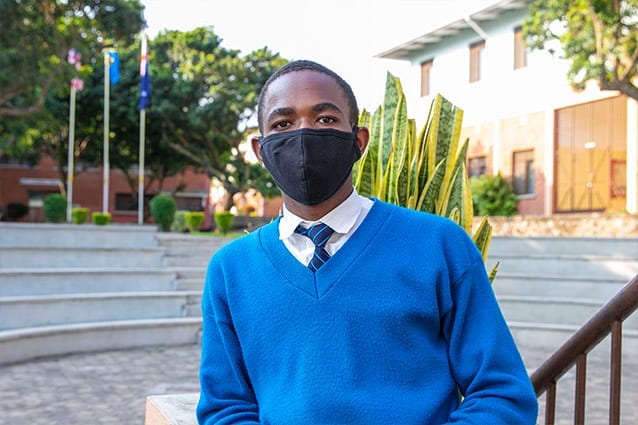
“For me, the most difficult part was to wear the face masks the whole day and washing hands regularly. When I left, this wasn’t the culture but I had to adapt,” he added.
Schools across Tanzania, including St Jude’s, were mandated by the government to close on 16 March and all students had to return home. Having to stay home for over three months, Samson and Daudi said they had a tough time coping when they returned to school.
“When I got back, having to stick to the school’s timetable was challenging.” To make up for the lost time all students are required to do an additional two hours of learning per day as directed by the government, “this has made it even more difficult for me to adjust,” Samson said. Daudi who was also of the same opinion added that “Although it was tough, the teachers had tests prepared for us when we returned to keep ahead in our learning.” To support the students, St Jude’s had prepared and delivered four rounds of study packs for all students to continue learning while they were at home. These included lesson notes, worksheets and even mock exams. Joshua, Samson, Daniel and Daudi all agreed that the study packs were extremely helpful, affirming that the packs were a reminder of their studies and priorities and that St Jude’s truly cares for them.
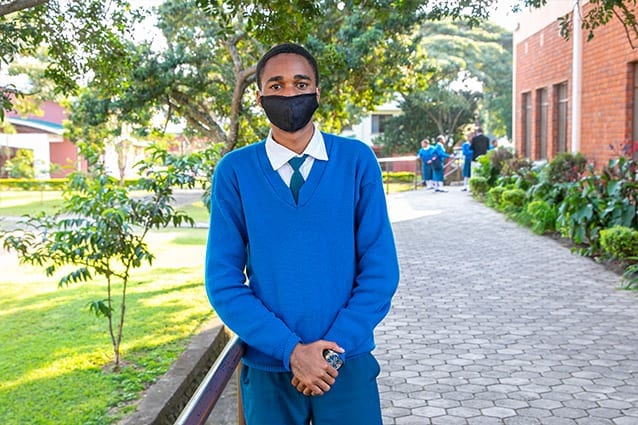
“The study packs were indicators of us going back to school. Before the packs, I would spend most of my time doing different chores around the house and helping my parents with some of their work. When the packs arrived, this helped me to re-focus on my studies. It was the best idea from St Jude’s,” Joshua said.
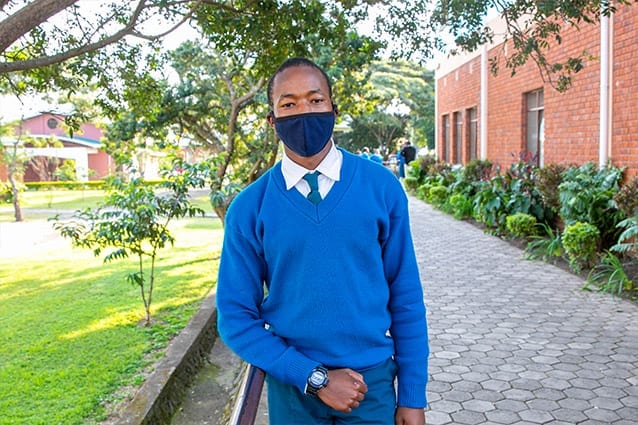
“My parents took the study packs very seriously. Before the study packs, it was hard for me to study. I would probably study for two minutes and get discouraged especially when I knew there was no grading. But the thought of teachers preparing, printing and delivering the packs and that the school was incurring cost in doing so just to support its students, this made me study hard as if I was studying for a real test.” Daudi said with a soft chuckle.
Now that the students are back at school, they’ll be studying hard until December. One thing is certain: despite all the challenges St Jude’s students faced due to COVID-19, education remained top priority.
